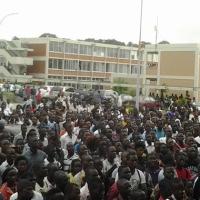
Mass strike in education sector shakes Ouattara’s government
The first decision of the government of Alassane Ouattara after its 2011 military victory over Laurent Gbagbo was to close down all public universities in Ivory Coast. This is a measure which he said was justified by the need to push for a thorough reform of the sector, and give another image of these universities. They remained closed for two years, and the children of the poor lost two academic years as a result.
Despite the closure of universities and the false promises made by the neoliberal government of Ouattara, there has been no noticeable change. There has instead been a waste of more than 111 billion francs (about 170 million euro) in “re-painting the facades” to try and seduce foreign investors, without meaningful improvements to the general studying and working conditions prevailing on the campuses.
Today, an important conflict is shaking the universities. For more than a week now, the public universities of Abidjan, the capital, have been paralyzed by a strike movement, supported by the overwhelming majority of students and teachers.
This conflict was triggered by the notorious and hated “University Police”, a militia in the pay of the Education Minister, Bakongo, who is using bullying and violent methods to impose “order” on the campuses. This police force is often composed of ex-elements of the rebel armed forces who fought on Ouattara’s side during the civil war, and who have been now integrated into the state apparatus.
But more generally, this conflict has brought to light the tragedy experienced by thousands of students in Ivory Coast. This situation can be summarized in eight points:
- Lack of infrastructure (classrooms, microphone, chairs, internet facilities, restaurant, library, rooms for practical work, equipment, toilets…)
- Intolerable increase of tuition fees (which have gone from 7,000 to 100,000 francs for bachelor’s degrees and 200,000 francs for masters)
- Presence of former militia rebels on the campus
- Insecurity due to the repressive and corrupt university police
- Inadequate university system in general (in terms of infrastructure but also in terms of practices in scientific research and teaching)
- Harassing and bureaucratic procedures for registration
- Lack of buses, which has already caused the death or amputation of several students because of the severe jostling that occurs when the rare buses arrive at the stop
- Occupation of university residences by former pro-Ouattara fighters
- Muzzling and repression of the student unions (via extremely brutal methods: about 10 students were seriously injured on February 21 following an attack by members of the University Police on students from the Faculty of Medicine at the University ‘Félix Houphouët Boigny’ of Cocody)
These are, briefly stated, the grievances of the Ivorian students against the regime of President Ouattara, grievances which already cost Bacongo a quasi-lynching last year.
The situation was also exacerbated by what is happening at the Police Academy (located opposite the university campus) where a list of 1,476 people admitted to the 2010 selection exam, during Gbagbo’s regime, continue to be denied access to their training, despite several contradictory government announcements. 65 of them were imprisoned and several were beaten up by the police.
In response to what is happening on the campus, the students and university professors went on strike. A few days later, many secondary school students paralyzed their schools as well, in solidarity with their elder brothers and sisters.
The only “mediation” by the government has been to send to the university of Cocody the commander of the Republican Guard, Wattao, a sordid character whose name appears systematically in each report of Amnesty International, Human Rights Watch etc, as strongly suspected of war crimes, massacres of civilians, looting, etc. during the civil war and since.
Minister Bacongo has also attempted to blame the presidency, inventing the pretext that the University Police was formed through a presidential decree, meaning it is not in his power to dissolve it (while the president is ill and being treated in France).
Students and teachers have reiterated their determination by making clear that the strike will continue until their two main demands, the unconditional withdrawal of the University Police from the universities and the cancellation of the rise in tuition fees, are met.
The ruling regime of Ouattara is terrorized by this new revolt from the students and the whole country is holding its breath. Given the highly explosive nature of the situation in Ivory Coast and the looming anger prevailing among many layers of the population because of the rocketing prices, the mass poverty and the corruption of the wealth-plundering ruling elite, it is possible that a call for a national strike would find important echoes among the toiling masses. This is what the CWI supporters in the country are arguing for.
We therefore call for maximum international solidarity to support the struggle of the Ivorian students.
We demand:
- The end of repression in Ivory Coast
- Freedom of expression and organization on campus
- The immediate dissolution of the university police
- The full cancellation of the rise of tuition fees
- The resignation of Bacongo
- A genuine rehabilitation of the universities through the effective participation of democratically-elected bodies composed of representatives of students, teachers and university workers
- The hiring of new teachers with improved wages and working conditions
- A massive programme of public investment in education and healthcare
- The extension of strike action to the rest of the working class, to build a general strike against the government
The situation remains unstable, more news will be published in the coming days.


Be the first to comment